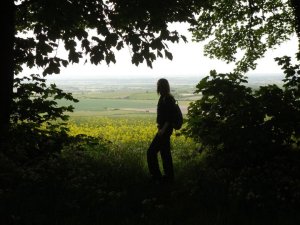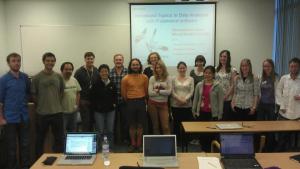Every person embarking on a PhD will have a unique journey through which they learn, grow and adapt. I hoped to share with you my experience, as there may be some aspects you can relate to and perhaps find helpful.
My PhD journey started a little unusually in March, rather than September time.
This meant for a very rapid move from Leeds to Reading and the setting up of field sites. Luckily for me, I had an amazing team of supervisors (Prof. Simon Potts, Dr. Mike Garratt and Dr. Alison Bailey), partners in the EU project STEP (Status and Trends of European Pollinators, www.step-project.net) and a second complimentary PhD project (Jennifer Wickens). Most PhD students will form the beginning of their PhD plans during the winter months and then test them the following summer. For me, I started and dashed over to Serbia for my first STEP meeting. This was a fantastic catch up game to start with and kept me on my toes. We utilised a range of resources and generated a farmer network in double time. The fieldwork was tough, as it is for everyone. However, it was absolutely worth the challenge. There are lots of stories, I can tell you. For instance, reasoning with a farmer we weren’t littering with pan traps (coloured bowls of water), finding piglets running from a car in the road and discovering a mammal’s very well concealed home to the side of the road which happened to be the place we pulled over in to. Ultimately, I’d suggest reading early, giving yourself plenty of preparation time, and documenting it absolutely everything.
After one year, it is normal to assess the first year and adapt or continue for the next year.
This is a time to see what worked and what didn’t over the season (it is typical to have some unsuccessful projects, you are discovering something new after all), and share it with others. For example, contributing posters and talks at conferences, departmental events and workshops. This is a daunting time, and I found it a time when you can overly judge yourself. The ‘second year blues’ some call it. It is something many scientists can experience, but fear not, you are probably doing fine (“you will do well if you are worried”– a wise Dr. Sara Ball once said). I found a helpful activity was to talk to others, as you’ll find out you’re not the only one with these thoughts, and very often the solutions are just around the corner. Also, try talking to others outside your immediate group, and you will soon find that you know more than you give yourself credit for!
Third time’s a charm.
By your third year you will feel you know the roads, understand your system and have a good idea what to expect. My supervisor once said, “By the third year you feel like you are ready to start the PhD”. This is because you are more efficient and effective and will achieve record breaking levels of productivity. This is a really fun time. A piece of advice here, if you haven’t managed it earlier then consider working with others on a shared project. For example, for me I enquired for assistance to help identify some insects. This is the most positive thing, for both you and your fellow friend can immensely benefit. Jon Finch was my friend indeed. He identified numerous carabids and helped boost the strength of the results and discovered a new species not yet discovered in the thousands previously identified. Awesome! I talked about PhD opportunities and what to consider when planning a project (update: he is now taking his own PhD journey in Australia! A great credit to his hard work).
What happens in the fourth year?
Everything. Everything except the fieldwork it feels like. In reality, it was the time to write like there was no tomorrow. I might just add, you will be writing throughout, but it is the final year when I felt like I could really write (as with anything, you get better with experience). Writing was part of it, but there were also opportunities to go to further conferences and speak more confidently about your findings based on your three years of research. By this point you will have made numerous friends supporting academically and non-academically (e.g. support in the audience, sharing conference notes and even sharing when something extraordinary happens – like Prof. E.O. Wilson comes to visit the UK!). I have now submitted my thesis only in the last week. The next stage is to prepare for the Viva exam and show the world what has been discovered through papers. Talk about exciting, right? This is not the end, but the start of something new. It’s going to be another step-change for sure. I wonder what new and exhilarating adventures will be next…
In summary, in my opinion the key to success is perseverance, friends … and good luck! Good luck my friends.
What was your PhD journey like? Do you have some words of wisdom you wish you could have told yourself at the start?






Perseverance is indeed the key! I am at the last stages now Vicky and taking all my willpower and perseverance to keep on writing day after day…hoping to hand in in a few weeks time! Congratulations on handing in yours 🙂
LikeLiked by 1 person
You have always been one determined lady! Thank you for your kind words :). Wishing you the very best of luck with your final stages and a wonderful break afterwards.
LikeLike